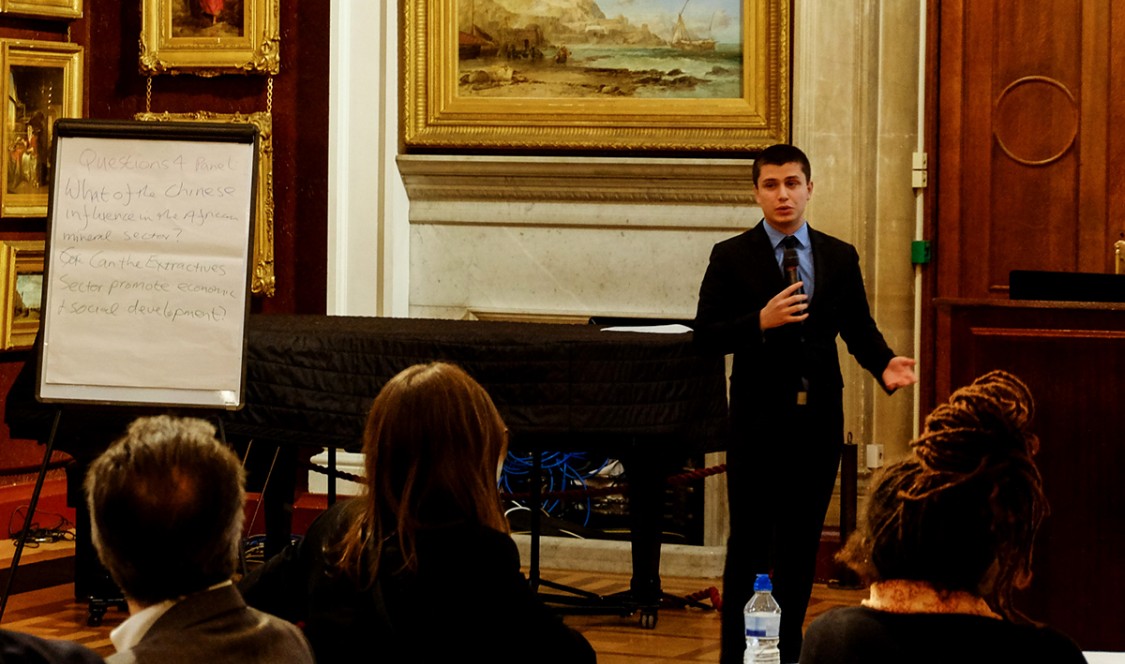Mining operations are growing in sub-Saharan Africa, bringing both prosperity and challenges to the region. A Claremont McKenna College student found himself presenting on the subject alongside some of the world’s leading experts on the mining industry at a conference in London.
John Nikolaou ’19 had been invited to the Nov. 2 conference, “Harnessing the Extractive Industries for Development in sub-Saharan Africa 2017,” to present his paper on artisanal mining in Ivory Coast. Artisanal mining refers to the practice of individual miners, usually the rural poor in developing nations, working to extract gold, diamonds, and other minerals.
While he wasn’t sure how he would get to the conference at Royal Holloway, University of London, Nikolaou knew he couldn’t pass up the opportunity. Fortunately, CMC has a center to help with that.
Nikolaou went to the Soll Center for Student Opportunity and applied for funds using its new experiential funding request form. The system matches CMC students with the most appropriate funding source for their requests.
Nikolaou became the first student to secure funding for an international trip through the new system, said Kelli Carter, a program coordinator for the Sponsored Internships and Experiences Program. Nikolaou was matched to the Presidential Student Research Fund.
After securing additional funding from CMC’s Government Department and the International Studies Program, Nikolaou flew to England to present his research.
While flipping through the program at the conference, Nikolaou saw that he was the only American speaker listed. In fact, most research on artisanal mining in Africa is based out of European universities, he said. He was, however, able to research the topic in Professor William Ascher’s course “Politics and Economics of Natural Resource Policy in Developing Countries.”
Ascher, the Donald C. McKenna Professor of Government and Economics and director of the Roberts Environmental Center, is a leading expert on natural resources and sustainable development in developing countries.
“John’s insights on the challenges for artisanal mining in the Ivory Coast, informed by his analysis of other cases as well, were certainly worthy of attention by much more senior development practitioners,” Ascher said.
Nikolaou noticed something else: He was the only undergraduate student presenting. The rest of speakers were Ph.D. students, professors, or mining industry experts.
Seeing the rest of the presenters’ titles was unnerving at first, Nikolaou said, but he reminded himself that he had also been invited to speak.
“They didn’t consider that I was only an undergrad,” he said. “They invited me based on the quality of my work. This really speaks to the merit of Professor Ascher’s course and the research we get to do here at CMC.”
No one suspected that he was still an undergraduate student, Nikolaou said.
He shared the floor with Gavin Hilson, a University of Surrey-based researcher who is considered the leading authority on small-scale and artisanal mining. Hilson was the conference’s keynote speaker and, it turned out, a source Nikolaou had cited in his paper.
Ascher noted that Nikolaou contributed in a setting where international development practitioners exchange case evaluations and insights to address compelling problems.
And like Nikolaou, he said, many other CMC students go beyond the classroom to engage in public policy discourse on a much broader stage.
—Michael Tesauro

